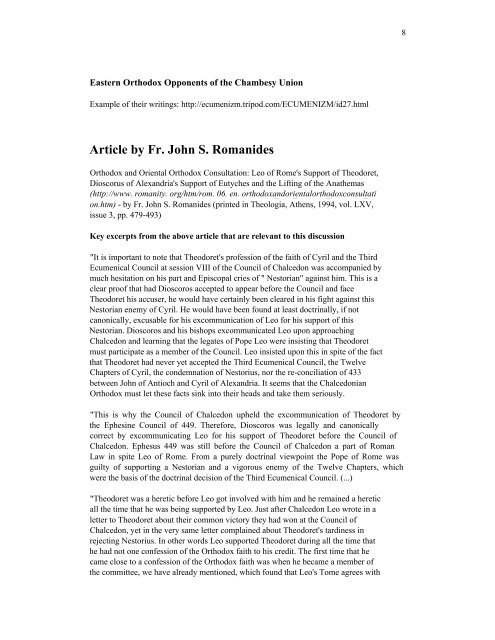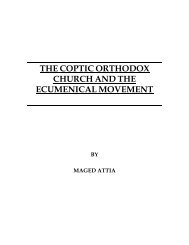Coptic interpretations of the Fourth Ecumenical Council - Saint Mina ...
Coptic interpretations of the Fourth Ecumenical Council - Saint Mina ...
Coptic interpretations of the Fourth Ecumenical Council - Saint Mina ...
Create successful ePaper yourself
Turn your PDF publications into a flip-book with our unique Google optimized e-Paper software.
Eastern Orthodox Opponents <strong>of</strong> <strong>the</strong> Chambesy Union<br />
Example <strong>of</strong> <strong>the</strong>ir writings: http://ecumenizm.tripod.com/ECUMENIZM/id27.html<br />
Article by Fr. John S. Romanides<br />
Orthodox and Oriental Orthodox Consultation: Leo <strong>of</strong> Rome's Support <strong>of</strong> Theodoret,<br />
Dioscorus <strong>of</strong> Alexandria's Support <strong>of</strong> Eutyches and <strong>the</strong> Lifting <strong>of</strong> <strong>the</strong> Ana<strong>the</strong>mas<br />
(http://www. romanity. org/htm/rom. 06. en. orthodoxandorientalorthodoxconsultati<br />
on.htm) - by Fr. John S. Romanides (printed in Theologia, A<strong>the</strong>ns, 1994, vol. LXV,<br />
issue 3, pp. 479-493)<br />
Key excerpts from <strong>the</strong> above article that are relevant to this discussion<br />
"It is important to note that Theodoret's pr<strong>of</strong>ession <strong>of</strong> <strong>the</strong> faith <strong>of</strong> Cyril and <strong>the</strong> Third<br />
<strong>Ecumenical</strong> <strong>Council</strong> at session VIII <strong>of</strong> <strong>the</strong> <strong>Council</strong> <strong>of</strong> Chalcedon was accompanied by<br />
much hesitation on his part and Episcopal cries <strong>of</strong> " Nestorian" against him. This is a<br />
clear pro<strong>of</strong> that had Dioscoros accepted to appear before <strong>the</strong> <strong>Council</strong> and face<br />
Theodoret his accuser, he would have certainly been cleared in his fight against this<br />
Nestorian enemy <strong>of</strong> Cyril. He would have been found at least doctrinally, if not<br />
canonically, excusable for his excommunication <strong>of</strong> Leo for his support <strong>of</strong> this<br />
Nestorian. Dioscoros and his bishops excommunicated Leo upon approaching<br />
Chalcedon and learning that <strong>the</strong> legates <strong>of</strong> Pope Leo were insisting that Theodoret<br />
must participate as a member <strong>of</strong> <strong>the</strong> <strong>Council</strong>. Leo insisted upon this in spite <strong>of</strong> <strong>the</strong> fact<br />
that Theodoret had never yet accepted <strong>the</strong> Third <strong>Ecumenical</strong> <strong>Council</strong>, <strong>the</strong> Twelve<br />
Chapters <strong>of</strong> Cyril, <strong>the</strong> condemnation <strong>of</strong> Nestorius, nor <strong>the</strong> re-conciliation <strong>of</strong> 433<br />
between John <strong>of</strong> Antioch and Cyril <strong>of</strong> Alexandria. It seems that <strong>the</strong> Chalcedonian<br />
Orthodox must let <strong>the</strong>se facts sink into <strong>the</strong>ir heads and take <strong>the</strong>m seriously.<br />
"This is why <strong>the</strong> <strong>Council</strong> <strong>of</strong> Chalcedon upheld <strong>the</strong> excommunication <strong>of</strong> Theodoret by<br />
<strong>the</strong> Ephesine <strong>Council</strong> <strong>of</strong> 449. Therefore, Dioscoros was legally and canonically<br />
correct by excommunicating Leo for his support <strong>of</strong> Theodoret before <strong>the</strong> <strong>Council</strong> <strong>of</strong><br />
Chalcedon. Ephesus 449 was still before <strong>the</strong> <strong>Council</strong> <strong>of</strong> Chalcedon a part <strong>of</strong> Roman<br />
Law in spite Leo <strong>of</strong> Rome. From a purely doctrinal viewpoint <strong>the</strong> Pope <strong>of</strong> Rome was<br />
guilty <strong>of</strong> supporting a Nestorian and a vigorous enemy <strong>of</strong> <strong>the</strong> Twelve Chapters, which<br />
were <strong>the</strong> basis <strong>of</strong> <strong>the</strong> doctrinal decision <strong>of</strong> <strong>the</strong> Third <strong>Ecumenical</strong> <strong>Council</strong>. (...)<br />
"Theodoret was a heretic before Leo got involved with him and he remained a heretic<br />
all <strong>the</strong> time that he was being supported by Leo. Just after Chalcedon Leo wrote in a<br />
letter to Theodoret about <strong>the</strong>ir common victory <strong>the</strong>y had won at <strong>the</strong> <strong>Council</strong> <strong>of</strong><br />
Chalcedon, yet in <strong>the</strong> very same letter complained about Theodoret's tardiness in<br />
rejecting Nestorius. In o<strong>the</strong>r words Leo supported Theodoret during all <strong>the</strong> time that<br />
he had not one confession <strong>of</strong> <strong>the</strong> Orthodox faith to his credit. The first time that he<br />
came close to a confession <strong>of</strong> <strong>the</strong> Orthodox faith was when he became a member <strong>of</strong><br />
<strong>the</strong> committee, we have already mentioned, which found that Leo's Tome agrees with<br />
8








